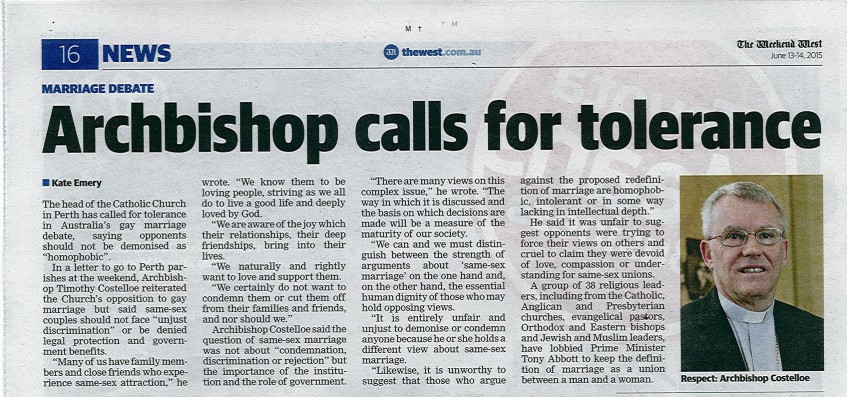Archbishop’s Pastoral letter evokes response

An Article on Archbishop Costelloe’s pastoral letter on same-sex marriage that was published in The West Australian on Saturday June 13. PHOTO: Supplied
By James Parker
Archbishop Costelloe’s recent pastoral letter on the ‘same-sex marriage’ debate was last week met with mixed reactions.
Articles were published primarily in The West Australian and online via PerthNow.com.au on Saturday June 13. However, the article was also picked up across other Australian online and print publications.
At the end of one online report, a commentator concludes “how far the Church still has to come to be relevant in the 21st century”. Another suggests that the Church is trying to “hark back to their golden era of the Dark Ages and Spanish Inquisitions”.
One critic named Oliver writes that “we are a secular country” and, therefore, that the Archbishop’s views are “not relevant”. However, another named Clinton comments that “if we are going to debate [‘same-sex marriage’], let’s at least be honest about the facts.”
Max (not his real name), 43, a businessman in Perth, is keen to share his own experience of being same-sex attracted and the role that the Christian journey has played in his life and struggles.
Max was adopted and raised in a Christian home. His parents divorced when he was in high school.
“My adopted dad was emotionally disconnected and gave me little to no attention or affection.
“We lived in the country away from the city, so I had few friends and felt very alone and isolated. I was literally dying for attention, affection and love from men, and I was willing to get it in any way I could.
“At age seven, I developed a non-sexual crush on Han Solo (Harrison Ford) in Star Wars. By 11, I heard about secret places where men met up together so I sought them out.”
“Even at such a young age, Max began to have phone conversations with older men and very soon met up with a 28 year old man who took advantage of him.
“I became addicted to sex, addicted to what I saw as attention and affection.”
As a same-sex attracted person, Max felt that his only option was to embrace the identity, psychology and physicality of the homosexual lifestyle.
“There is little to no public voice to offer hope to those that might not want that option, or even know there is another option outside of the narrow view of the gay community, and now increasingly the secular heterosexual community with its own promiscuous outlook.
“This sex addiction became a way of life into my twenties,” he stated, and yet “the trauma of those relationships made me forsake having boyfriends at all when I discovered Crystal Meth. I then became insanely promiscuous and even worked as a gay prostitute.”
Max recalls working for a gay couple who had been non-legally “married" for 20 years and who were held up as a model for the gay community.
“Both of them,” he said, “had addictions to pornography and sex outside of the relationship. I came to realise that if this was the best “model of the community”, then I didn’t want to have any part of it.”
A couple from a local church deliberately reached out to Max while he was swallowed up in his addictions. The pure and unconditional affection they demonstrated impacted him greatly.
After 20 years in the gay lifestyle and community, his focus shifted gradually from his own rights and pleasure to desiring a deeper relationship with Christ. Four years ago he married his wife and they recently became parents.
Max believes that today the Church needs to focus on life transformation. “Through Christ,” he points out, “the Church can offer the most profound and lasting transformation there is.
“Regardless if someone believes that [same-sex attraction] is “inborn” or “acquired,” the community of those who have chosen to “opt-out” of the homosexual lifestyle are not recognised as a valid minority.”
Max sees this minority celebrated in parts of the Church, but completely disregarded by those outside. “The voices of the children who have grown up in homosexual-parented homes aren’t given the voice that needs to be heard either. There are children who love their parents dearly, but also recognise that they were denied one parent at best, indoctrinated in a lie at worst.”
Max proposes that, in a society which values acceptance and abhors discrimination, proponents of ‘same-sex marriage’ “take the moral high ground and not discriminate or persecute those that have valid intellectual and practical opposition to their views, especially those of us who have left the lifestyle they are promoting. Our perspective is worth listening to,” he says.
Similarly, this view is shared online by Tom who, commenting on the Archbishop’s pastoral letter, says, “Tim Costelloe is simply talking good old fashioned common sense. We just respect what others believe or wish for themselves and hopefully they return the same regardless of differing viewpoints.”
